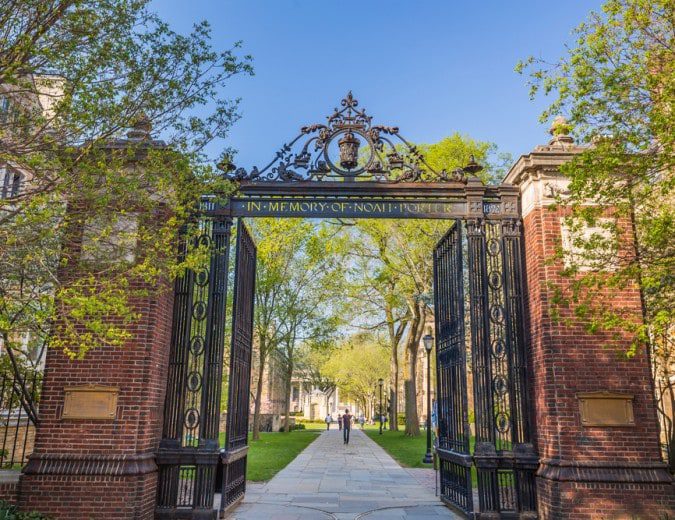The slow advance of psychedelic-aided therapy into mainstream American consciousness is gaining gravitas, with Yale University joining the fray. Members of the Yale School of Medicine have formed the Yale Psychiatry and Psychedelics Group (YPSG) to discuss the growing body of research around the use of psychedelic substances in therapeutic settings.
“The YPSG does encourage a rigorous examination of recent findings from carefully controlled basic and clinical research studies,” Gerald Valentine, MD, clinician in psychiatry at Yale and one of the group’s faculty organizers, said in an email to Reset. “We believe that findings from research with psychedelics will continue to be applicable to various disciplines including psychiatry, neuroscience and thanatology.”
The group plans to gather monthly “to examine the intersection of mental illness, psychopharmacology, and psychedelic substances from a historically-informed and critical perspective, and mold new trends of thought in the field,” according to a press release.Yale’s interest comes at a time when research into psychedelics is blossoming after a decades-long hiatus that started when the substances were banned by the U.S. government. Already, studies at the Harbor-UCLA Medical Center, Johns Hopkins University, New York University, and the University of Wisconsin in Madison using psilocybin to treat anxiety and other mental disorders have either completed or are ongoing. The Multidisciplinary Association of Psychedelic Studies (MAPS) is also sponsoring research on potential beneficial uses for various substances.“The emergence of the YPSG at this time is primarily a reflection of the historic moment,” says Valentine. “The re-emergence of ‘psychedelic science’ at respected academic centers has imbued the field with sufficient gravitas to convince the Yale Department of Psychiatry to support a forum that promotes intelligent discourse on contemporary research in this area. In addition, I believe there is a pent-up demand from the general public for a thoughtful re-examination of the therapeutic utility of psychedelic compounds because of the promise they hold, especially in conditions that are otherwise ‘treatment refractory’ — including death.”Indeed, many of the subjects of the various studies have reported coming to grips with their mortality and feeling grateful for their lives after using psilocybin to treat anxiety related to terminal cancer diagnoses.So far, the results of the research have been compelling, and could portend a bright future for the use of psychedelics in therapy. “The YPSG does not believe that what might appear to be ‘extraordinary claims’ based upon recent findings require extraordinary levels of evidence, only evidence that is based upon reproducibility and sound research design,” says Valentine.
Currently, the Yale group is just discussing the studies that are taking place at other institutions, not planning their own. “The YPSG is not conducting research at Yale and we do not have plans to develop research protocols,” Valentine says. “However, it is possible that the activities of the YPSG will promote ‘enabling conditions’ for the execution of innovative clinical research at Yale, and at other centers as well.”
The doctor stresses that taking psychedelic substances should not be treated lightly. “The YPSG does not believe that psychedelics are inherently beneficial,” he says. “We recognize that contemporary research must carefully screen subjects to minimize negative reactions, use controlled environments staffed by competent professionals, and only administer research chemicals of known quantity and purity. ‘Street’ or ‘recreational’ use of drugs is dissimilar to clinical research protocols for these and other reasons.”
The group is not taking a political position, Valentine notes, but he does acknowledge the burden that federal prohibition places on academic and clinical research. “Although the YPSG hopes to enlarge the scope of discussion, as we begin our academic life at Yale, our initial focus will be on therapeutics and mechanisms of action of psychedelic treatments,” he says. “Therefore, the YPSG presently has no position on the future of the regulatory matrix for applied psychedelic treatments. However, it is clear that the Schedule I classification for psychedelic compounds impedes research and continues to influence the public perception of an unacceptable risk-benefit ratio.”
Although some advocates, like MAPS, are pushing an ambitious goal of removing federal restrictions on the use of certain substances in the next few years, Valentine says that for now the government is still an obstacle to research. “To the best of my knowledge, there is no precedent for the reclassification of a Schedule I compound and this poses a major barrier to the rationale deployment of psychedelics,” he says, “and unfortunately, this may even occur in clinical situations where psychedelics are shown to be markedly superior to existing treatments.”
Other members of the group include Peter H. Addy, PhD, associate research scientist in anesthesiology, Robert Krause, MSN, APRN-BC, lecturer at the Yale School of Nursing, and several other members of the school’s psychiatry program.
Addy led an initial session in January, focused on historical and recent uses of psychedelic-aided psychotherapy, and the group’s next meeting will be February 9 on the topic of “Psilocybin in the Treatment of Smoking Addiction: Psychological Mechanisms and Participant Accounts,” led by Albert Garcia-Romeu, Ph.D., research associate in Psychiatry and Behavioral Sciences at the Johns Hopkins School of Medicine.

